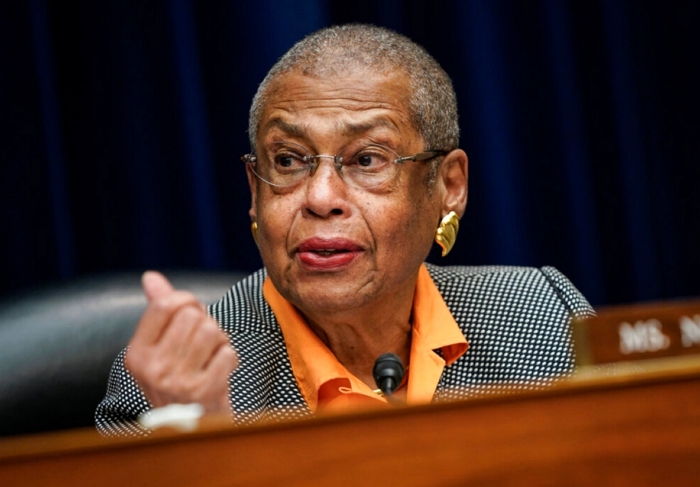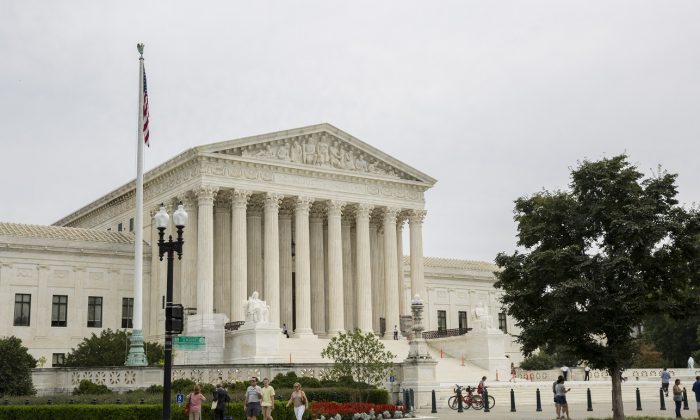2013년 미국 미시간의 한 장례식장에서 6년간 일하던 남성 엔서니 스티븐스는 자신의 ‘성정체성’이 여성이라고 주장했다가 회사로부터 해고됐다. 이 사건은 현재까지 법정싸움 중이다. 핵심은 성차별을 금지한 민권법 보호대상에 ‘성정체성’이 해당되는지 여부다. 지난 16일 트럼프 행정부는 대법원에 제출한 서류에서 성차별 금지는 남녀차별을 포괄하지만 성정체성(성적 지향) 차별은 포함되지 않는다는 2017년 입장을 재확인했다. 당시 이 결정은 2014년 남녀 차별 금지에 성정체성을 포함시킨 오바마 전 대통령의 행정명령을 원상태로 돌려놓았다. 이번 조치는 성정체성이 성별을 좌우할 경우 사회가 기존에 유지하던 남녀 수면시설, 샤워실, 화장실을 유지할 수 없게 될 것이라는 우려를 반영했다. -편집부
WASHINGTON—Civil rights laws don’t protect transgender employees from being fired because of their gender identity, the Trump administration argued in a new filing with the Supreme Court.
The legal brief was filed Aug. 16 in R.G. and G.R. Harris Funeral Homes Inc. v. Equal Employment Opportunities Commission, a lawsuit involving a transgender person, Aimee Stephens, formerly known as Anthony Stephens, who was fired by a Michigan funeral home.
In 2013, Stephens declared a desire to begin dressing as a woman while at work and was fired by Thomas Rost, the Christian owner of the business, who said he was merely upholding a sex-appropriate dress code. Rost made it clear he wouldn’t have fired Stephens for dressing as a woman outside of work. Stephens refused to comply with the sartorial rule and turned down an offer of severance pay.
The U.S. Equal Employment Opportunity Commission (EEOC) sued on Stephens’s behalf and lost at the trial level, but then prevailed in the 6th Circuit Court of Appeals. Citing a 1989 Supreme Court precedent known as Price Waterhouse v. Hopkins, the appeals court found that Stephens was fired unlawfully for failing “to conform to sex stereotypes.”
While the case was working its way through the judicial system, in October 2017, the Trump administration announced that going forward the Department of Justice would take the position that the law’s “prohibition on sex discrimination encompasses discrimination between men and women but does not encompass discrimination based on gender identity per se.”
The decision undid a December 2014 directive issued by the Obama administration that took the opposite position.
On April 22, the Supreme Court agreed to hear the funeral home’s appeal but a date for oral arguments hasn’t yet been scheduled. The Supreme Court will consider whether the sex-discrimination provision in Title VII of the Civil Rights Act forbids discrimination against transgender individuals, whether because of their transgender status or because they don’t adhere to culturally accepted notions of how men or women should appear or behave.
“Congress has enacted definitions of a number of terms used in the statute, but it has never enacted a Title VII-specific definition of ‘sex,’” Solicitor General Noel J. Francisco wrote in the brief.
The brief states that at one point Congress added a provision to the statute stating that “[the] terms ‘because of sex’ or ‘on the basis of sex’ include, but are not limited to, because of or on the basis of pregnancy, childbirth, or related medical conditions,” but “Congress has otherwise left ‘sex’ undefined.”
John Bursch, a vice president and senior counsel for the Alliance Defending Freedom, a Christian public interest law firm based in Scottsdale, Arizona, that is representing the funeral home, argued in an op-ed at National Review that if the business loses the case, “legal chaos and adverse consequences for everyone” will be unleashed.
“If ‘sex’ is governed by ‘gender identity,’ organizations will no longer be able to maintain sex-specific sleeping facilities, showers, restrooms, and locker rooms,” said Bursch. “Men can take jobs reserved for women, such as a position playing in the Women’s National Basketball Association, or a job as a female nurse hired to care for an elderly woman’s private needs. Scarce jobs requiring fitness tests, such as police and fire positions, can exclude women as they are forced to compete against men who identify as female.”
In its petition to the Supreme Court, the funeral home stated: “Redefining ‘sex’ to mean ‘gender identity’ is no trivial matter. Doing so shifts what it means to be male or female from a biological reality based in anatomy and physiology to a subjective perception evidenced by what people profess they feel.”




![[태양의 길, 24절기] 생명의 비, 곡우(穀雨)…봄비 내려 백곡을 기름지게 하는 날](https://kr.theepochtimes.com/assets/uploads/2024/04/888-235x132.jpg)
![표현의 자유를 제한하다…기나긴 ‘검열’의 역사 [프리덤퍼스트]](https://kr.theepochtimes.com/assets/uploads/2024/04/fffr-235x132.jpg)
![먹거리만으로도 우울·불안에서 벗어날 수 있어…핵심 영양소 3가지는 [바이탈사인]](https://kr.theepochtimes.com/assets/uploads/2024/04/sss-1-235x132.jpg)